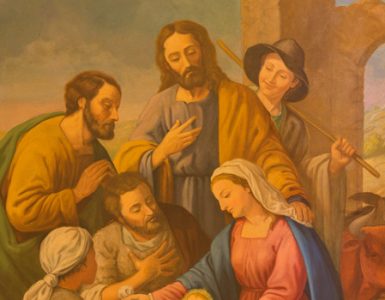Brothers and sisters, rejoice in the Lord always.
Is it possible to have constant joy amid the trials, temptations, disappointments, and challenges of this present life?
St. Paul answers a resounding Yes when he proclaimed, “Brothers and sisters: Rejoice in the Lord always. I shall say it again: Rejoice!” (Phil 4:4). He attests that we can indeed rejoice always only if we are rejoicing in the Lord Jesus.
This means that our joy depends primarily on our image of God, i.e., how we have come to see God and relate with Him in all the events of our life. We cannot have true and enduring joy without an appropriate image of God, one that is strong and effective enough to influence our choices and attitudes in life.
In Zep 3:14-18, the Prophet Zephaniah gives us a powerful image of God that should be the source of our interrupted joy in this life.
Firstly, God is a God of Joy. He rejoices over His people even in their infidelity because they still remain His own people: “He will rejoice over you with gladness.” The joy of the Lord endures forever. It does not depend on the fidelity or infidelity of His people.
Secondly, God does everything to communicate His joy to His people. He forgives all their sins; “The Lord has removed the judgement against you.” He gives them a new beginning and does not consider their past failures. “He will renew you with His love.” They do not have to lose their joy over past regrets.
Thirdly, God draws near to His people to be with them: “Fear not, O Zion, do not be discouraged! The Lord, your God, is in your midst, a mighty Savior.” He does not separate Himself from His people for any reason. His abiding presence with them should bring them joy.
In Jesus Christ, the Word made flesh, this God of joy is always present with us. He is always drawing nearer and doing everything to communicate His own joy to us. This is why He can solemnly assure us that His union with us is for the sake of sharing this joy, saying, “These things I have spoken to you, that my joy may be in you, and that your joy may be complete” (Jn 15:11).
St. Paul grasped this truth with conviction. The God of joy is so close to him even in his prison cell. He can rejoice always and call us to do likewise only because of the proximity of the God of joy. “The Lord is near,” he wrote. His words from incarceration show us that only in the Lord Jesus can we find a joy that is guaranteed to endure forever, completely satisfy us, and give us strength to face the trials of life.
So, how can we rejoice always in the Lord and not have to settle for erratic and conditional joy?
We must first examine our image of God and how we came to have such an image. We cannot be joyful when we see God as distant, uncaring, morally permissive, unable to help us, merciless, punishing, disconnected from our pains and sorrows, etc. How can we hope for joy when we see God as a divine policeman who cannot wait to penalize us for our sins and failures?
Our image of God must flow from the scriptures and be enforced by our experience of God in daily life if it is going to be a source of joy for us. It must also affect how we relate with others, interpret events, and respond to them. We must begin to renounce all the faulty images of God and beg God to imprint in us more appropriate images of Himself.
Secondly, we must avoid settling for worldly joys alone. Just as Jesus said to us, “You cannot serve two masters” (Mt 6:24), we also cannot hope to experience the joy of the Lord while seeking complete satisfaction in worldly joys that leave us dissatisfied and disappointed. We turn our backs on the joy of the Lord when we place all our hope in our pleasures, possessions, fame, reputations, comforts, successes, achievements, abilities, etc. We are made for a joy that transcends these things.
Thirdly, we should beg for the joy of the Lord every day of our lives. It is His love that brings this joy into our hearts. Thus, we open our hearts to the joy of God whenever we allow His merciful love to cleanse us of our sins in the sacrament of Reconciliation. We experience the joy of the Lord when we allow His love to feed us with Himself in the Eucharist. We open our hearts to the joy of the Lord when our prayers deepen and allow us to connect with His love for us.
Lastly, we should do all that we can to draw nearer to the God of joy. If the God of joy draws nearer to us to give us His joy, shouldn’t all our efforts be aimed at drawing nearer through our words and actions to receive His joy? Because “the joy of the Lord is our strength” (Neh 8:10), we should do and endure anything to experience this joy. For the sake of this joy of the Lord, we should reject any compromise with sin or selfishness and embrace all that draws us closer to God. We should seek to do His will above all things so that we enter into Jesus’ joy.
John the Baptist’s hearers sensed his unique mission and asked him, “What should we do?” (Lk 3:10). They sensed that he had some relationship with the Messiah, and they needed to act appropriately to receive what he offered. Are we also asking the God of joy what we should do and say to receive the joy that He alone brings to us? Are we ready to offer “prayer and petitions,” as St. Paul recommended? Shouldn’t we also obey the words of the Baptist and share what we have with others who have nothing, practice honesty, and treat others with kindness so that we can enter into the joy of the Lord? Is there anything too great to give up for the sake of this joy?
We turn to the Blessed Virgin Mary on this last day of Advent and beg her to draw us into this joy of the Lord. She opened her heart completely to this God of joy at the Annunciation by doing His will. She also experienced the power of this joy for doing good when she promptly visited Elizabeth and exclaimed, “My spirit rejoices in God, my Savior” (Lk 1:47). She never sought joy in herself or in any other creature.
Our Eucharist is an encounter with the God of joy who unceasingly draws near to us to share His own joy with us. May the Blessed Virgin Mary, the cause of our joy, help us to do all that we can do to draw nearer to Him this Christmas. This is the only way that we can rejoice always in this chaotic world because we will then be rejoicing in the Lord alone.
Glory to Jesus!!! Honor to Mary!!!
Image from Wikimedia Commons












